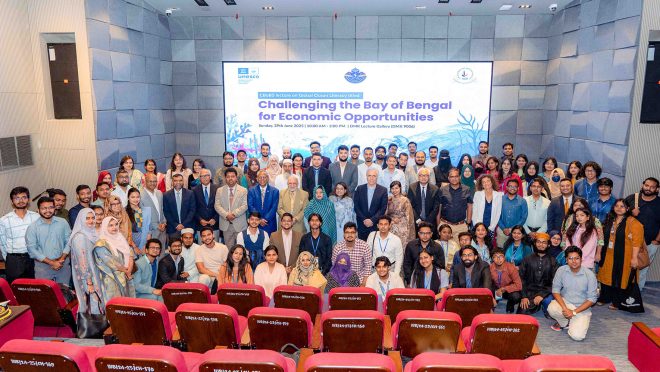CBoBS hosts lecture on turning Bay of Bengal challenges into opportunities
CBoBS hosts lecture on turning Bay of Bengal challenges into opportunities

The Centre for Bay of Bengal Studies (CBoBS) of Independent University, Bangladesh (IUB), in collaboration with the Department of Global Studies and Governance (GSG), and in partnership with the Intergovernmental Oceanographic Commission (IOC) of UNESCO, organised a public lecture titled “Challenging the Bay of Bengal for Economic Opportunities” on 29 June 2025. Held in observance of World Environment Day 2025, the event aimed to promote ocean literacy and examine sustainable economic prospects in the Bay of Bengal through academic exchange and policy-oriented dialogue.
Vice Chancellor Prof. M. Tamim delivered the welcome remarks. Rear Admiral Md Khurshed Alam (Retd), Director of CBoBS and Former Secretary to the Ministry of Foreign Affairs, presented the keynote address. Rear Admiral Dr. Khandakar Akhter Hossain, Vice Chancellor of Bangladesh Maritime University; H.E. Marie Masdupuy, Ambassador of France to Bangladesh; and Mr. Didar A Husain, Chairman of the Board of Trustees, IUB, also addressed the audience.
Ambassador Tariq A. Karim, Advisor to CBoBS, introduced the academic session by discussing the long-term environmental implications of daily actions and the urgency of preserving ocean systems.
The session included academic presentations on the seven core principles of ocean literacy. Dr. Emadul Islam, Senior Fellow, Ocean Policy Research Institute, Sasakawa Peace Foundation (Japan), discussed plastic pollution and marine conservation. Prof. Dr. Wahidul Alam, University of Chittagong, spoke on biodiversity and human-ocean interdependence. Dr. K.M. Azam Chowdhury, University of Dhaka, addressed the ocean’s role in weather and climate. Cdre Sheikh Shahid Ahmed from the Bangladesh Maritime University, examined the role of oceanic features in shaping the Earth. Zubaida Mannan, Deputy Secretary General, Bangladesh National Commission for UNESCO, emphasised the integration of ocean literacy into school curricula.
In his closing remarks, Prof. Daniel W. Lund, Pro Vice Chancellor of IUB, said: “A few years ago, I had the opportunity to observe a young family on a beach south of the Bay of Bengal. The mother and father were introducing their two children to the abundant, vibrant life in the sands and shallows of the receded tide. The parents pointed to a starfish and the children’s eyes lit up with curiosity and wonder. As the family walked along the beach observing the rich life in the sand, they each had a garbage bag and were excitedly picking up bits of trash along the way. This was truly ocean literacy in action. Even though the problem seems enormous, we can each start with little impactful actions and conversations that lead to broader cooperation and solutions that benefit all of our lives and the oceans that surround us.”
Discussion topics also included government-level infrastructural planning, policymaking, and strategies for knowledge dissemination by embedding ocean literacy throughout children’s school years. Participants also explored possible models for reaching underprivileged communities through customised approaches.
The programme concluded with student-led recommendations on strengthening ocean literacy in Bangladesh through education reform, digital platforms, and experiential learning. An open discussion and Q&A session followed.


